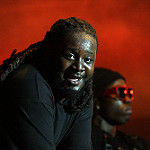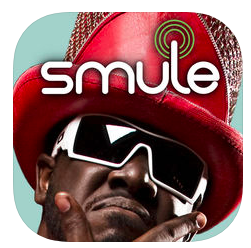As talked about, this new style that T-Pain brought with auto-tune was unique to Hip-Hop and changed the sound of the genre. His multiple hit songs including “I’m N Luv”, “Bartender”, “Buy U a Drank” and many others climbed the billboard charts, dominating clubs across the country. This music and synthesized sound was appealing to the club scene as it was easy to dance to and addressed many of the topics and scenarios that played out in such venues. T-Pain made the “misuse” of auto-tune a part of his sound”[1]
His technological use impacted the greater music industry by sparking other artists to use auto-tune in a similar way. Musicians began to go beyond the pitch correction methods and actually alter vocals and sounds to create something seemingly “new” compared to much of the music previously released. His use then “prompted other artists to adopt techniques,”[2] similar to his.

Lil Wayne
T-Pain’s sound attracted the likes of multiple rappers in the mid 2000s, but most notably, Lil Wayne. Lil Wayne was already a successful up and coming artist before Rappa Ternt Sanga with his releases of Tha Carter in 2004 and Tha Carter II on the
same day as T-Pain’s debut album in 2005.
In Lil Wayne’s first two albums, even though he brought his own unique style with his up-tempo, “in your face” kind of beats, his work was still being grouped with those of the late 90s, as he identified himself as a member of the street gang the Bloods. He, in turn, had a gang like impression and implications of gang life situations in his music. In 2008, Lil Wayne released Tha Carter III which was his breakthrough album. Tha Carter III won a grammy for Best Rap Album and is still to this day one of the highest grossing and most popular albums in the Hip-Hop genre. The the thing that stood out as the biggest difference between this album and the first two were his use of auto-tune in the later one. Additionally, it was believed to be influenced due to Wayne’s close relationship with the auto-tune king, T-Pain. The album also featured T-Pain as a guest artist, making the relation and direct influence even more evident. This album, with all its success, made auto-tune accepted in the rap game as people more than readily received and understood the creativity behind it. T-Pain was no longer the only one to be experimenting with auto-tune in the Hip-Hop world.
Listen to Tha Carter Here.
Listen to Tha Carter II Here.
Listen to Tha Carter III Here.
Other Popular Musicians T-Pain Influenced
T-Pain can be linked to Kanye West‘s musical choices, along with the work of rapper Diddy. “When Kanye West was looking for an effect to match some heartbroken lyrics, he flew T-Pain to Hawaii to see how many ways they could tweak Auto-Tune. Diddy gave a percentage of his upcoming album’s profits to T-Pain in exchange for some lessons. Even Prince is rumored to be experimenting with Auto-Tune on his new record.”[3] T-Pain’s use of auto-tune in his hip hop and rap extended into the use by other well-known artists. As in Diddy’s case, artists were even willing to pay for T-Pain’s help in creating sounds similar to those he used on his albums.
With T-Pain’s initial exploration with this wave of creativity using auto-tune, it has allowed for some of the most successful artists that we see in present day to be accepted for their use of the technology.
In 2009, an app titled I Am TPain was released in response to the growing popularity surrounding T-Pain’s intense auto-tune use. The app allowed users to play with manipulation of their vocals in ways similar to T-Pain. The app totaled more than 2 million downloads, proving his widespread influence and popularity.[4]
Click here to find the app in the App Store.
Popular Culture Influence
T-Pain even appeared on the Ellen show for his popularity through auto-tune. His name quickly became associated with the technology, and people outside the immediate music industry took notice. T-Pain effectively set himself apart from other artists, capitalizing on his uniqueness and pioneering.
[5]

